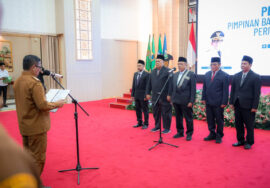
Moderate Jihad, Indonesia Strong
By Prof. Dr. H. Wawan Wahyuddin, MPd,
Rector of UIN Sultan Maulana Hasanuddin (SMH), Banten.
(INDONESIAN) Not everyone can embrace a moderate spirit, but fortunately, most Muslims in Indonesia tend to have a moderate outlook. This moderation doesn’t happen by chance; it’s rooted in strong reasons.
In practicing moderate faith, there are two key factors: first, it’s present in the religion itself, such as in the Quran, Al Hujurat verse 13, which emphasizes unity among different people and nations. Second, it’s influenced by culture, as each ethnic group has its own distinct cultural heritage.
In the eastern archipelagic region known as Nusantara, Islamic traditions have flourished since the fall of Majapahit, thanks to the subtle efforts of the Wali Songo. They understood the challenge of separating religion from culture.
 Culture, in many ways, acts like the clothing of one’s ethnicity, imbuing unique characteristics and typography. Thus, the propagation of religion is carefully crafted to align with local customs without violating Islamic principles, ensuring acceptance by the local population.
Culture, in many ways, acts like the clothing of one’s ethnicity, imbuing unique characteristics and typography. Thus, the propagation of religion is carefully crafted to align with local customs without violating Islamic principles, ensuring acceptance by the local population.
For instance, the long “mulud” event in Banten is a tradition, not a religious rite. However, it enhances religious celebrations. As H. Roma Irama pointed out, cultural traditions like this do not contradict Sharia law; there’s nothing wrong with them.
The creation of various religious traditions has become a powerful force that influences many aspects of life, especially the economy. For example, during “muludan” events, there’s a tradition of crafting miniatures of buildings, houses, mosques, ships, or animal figures like giraffes, buffaloes, and fish. These events boost the local economy, as items like eggs and decorative paper become popular.
Thus, the moderate spirit of early scholars has led to the creation of traditions like “muludan,” which continue to benefit the community, particularly economically. This highlights the merging of religious and cultural aspects due to moderation.
On October 22nd, which is the National Santri Day in Indonesia, we commemorate the resolution of jihad declared by Hadratus Syekh Hasyim Asy’ari on October 22, 1945. Moderation has become a powerful force that is worth advocating.
In this context, jihad is about maintaining a flexible and accommodating attitude, continually promoting moderation. It’s about being flexible and accommodating in actions. However, this flexibility is meant to be robust, signifying a commitment to promoting moderation.
Why be flexible? Because flexibility makes it easier for others to accept. Why be accommodating? Because accommodation makes others trust and feel at ease. Therefore, flexibility and accommodation are essential.
The strength of flexibility and accommodation has been a part of Indonesia’s cultural heritage for generations. Different cultures, beliefs, and religions have been welcomed without conflict. The beliefs and practices that arrived were accepted, but if they didn’t align well, they were adapted to something new.
When Islam arrived in Java following the fall of Majapahit, it was initially politely declined by Sabdo Palon Nayagenggong. He stated, “We already have beliefs similar to the religion taught by the Prophet from Arabia. Our beliefs suit us well, like a well-fitting garment—neither too tight nor too loose,” in response to Islamic preachers, including the Sunans of that time.
This polite rejection, however, was accompanied by even more flexibility and accommodation. As a result, Islam continued to thrive in the Indonesian archipelago. Therefore, on National Santri Day in 2023, with the theme “Jihad Santri, Advancing the Nation,” the power of moderation has already manifested, and santri (Islamic students) can exemplify this moderation.








